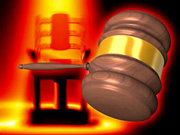|
|
|
High court takes up price-fixing case
Court Watch |
2007/03/25 10:04
|
| When a family-owned retailer in Texas lowered prices on women's fashion accessories, the manufacturer cut off the store's supply. Phil and Kay Smith sued and won in a case now before the Supreme Court that asks whether price-fixing always is illegal. Arguments before the justices were scheduled for Monday. The manufacturer, Leegin Creative Leather Products Inc. in City of Industry, Calif., is challenging a 1911 Supreme Court ruling that automatically classifies agreements to set minimum prices as anticompetitive. Leegin says that by maintaining price consistency among niche retailers it sells to, stores can offer improved customer service. That, says the manufacturer, enables smaller stores to compete against rival brands sold by bigger cut-rate competitors. At issue is whether price floors such as Leegin's always should be treated as illegal or evaluated case by case to see if they are pro-competitive. The Smiths say they lowered prices by up to 20 percent because several other retailers selling Leegin's Brighton brand also were lowering prices. The Smiths say they and the competing stores were threatened by Leegin with being cut off unless they raised their prices again. Alone among the threatened stores, the Smiths refused to cave in. "When Leegin stopped shipping to us, my wife and I lost half our business," Phil Smith said in an interview. "Kay and I are back to the same size store we started with 21 years ago." Discounters and consumer groups say consumers will suffer if the Smiths lose. "In the Internet age, this is a dagger at the heart of the most consumer-friendly environment we've seen in generations," said Mark Cooper, a spokesman for the Consumer Federation of America. "Would there ever have been a Sears & Roebuck, an A&P, a Walgreens, a Kmart or a Wal-Mart" absent a ban on minimum pricing agreements? the federation asked in court papers filed in support of Kay's Kloset. In Leegin v. Kay's Kloset, the Bush administration says it is inappropriate to automatically prohibit price floor agreements when they are not necessarily anticompetitive. Thirty-seven state attorneys general oppose the administration. |
|
|
|
|
|
|
Pfizer loses court ruling on Norvasc patent
Court Watch |
2007/03/23 09:53
|
Pfizer Inc. said Thursday that a federal appeals court has overturned a lower court decision that upheld the patent protecting its widely-prescribed hypertension drug Novasc, a move that opens the door to early generic competition. In a statement, Pfizer said the U.S. Court of Appeals for the Federal Circuit reversed a lower court ruling in favor of Pfizer, which found the Norvasc patent to be valid and enforceable. The appeal was brought by Apotex, which has been seeking to have the Pfizer patent nullified in order to put out a generic version of the drug. Pfizer added that it is "reviewing the decision and is considering all its options, including seeking reconsideration."
Other generic drugmakers have also been seeking to put out generic versions of the drug, including Mylan Laboratories (MYL) . Norvasc is slated to lose patent protection later this year. Prudential analyst Timothy Anderson said in his note Thursday that the appeals ruling could allow for the introduction of generic versions of Norvasc as soon as next week. "We did not anticipate this ruling, but it will probably only have a muted impact on Pfizer which is already a washed-out, low valuation name," wrote Anderson. "Earlier generic entry is a negative and could cost the company $1 billion in sales or so in 2007, but given Pfizer's size and cash generation this it not very material to the company's future outlook, in our opinion," Anderson added. |
|
|
|
|
|
|
Court supports FCC in VoIP regulation
Court Watch |
2007/03/22 09:17
|
| A federal appeals court upheld a decision by the Federal Communications Commission that barred states from regulating Internet-based phone services, an Associated Press report said. The Associated Press report said a three-judge panel of the 8th Circuit Court of Appeals agreed with the FCC's determination in 2004 that companies like Vonage Holdings provide an interstate service that puts them outside state control. Vonage uses VoIP, which involves converting the sound of a voice into packets of data and reassembling them into sound at the other end of the call. In 2003, Minnesota's Public Utilities Commission tried to register Vonage as a phone company, which would have subjected it to state tariffs and rate regulations, the report said. A federal judge barred Minnesota from doing so, and a year later at Vonage's request the FCC ruled that the company's services could not be regulated by the states. Regulatory agencies in a number of states, including Minnesota, appealed that ruling, the report said. In the decision authored by Fargo, N.D.-based 8th Circuit Judge Kermit Bye, the court agreed with the FCC's determination that the nature of VoIP telephone calls allows customers to place "home" phone calls from nearly anywhere, irrespective of state lines, the report added. When the FCC issued its ruling in 2004, officials with the agency indicated that they believed streamlined regulation was key to the growth of the fledgling industry. The report further quoted Vonage CEO Mike Snyder as saying that the decision was good news for the company's 2.2 million subscribers.
|
|
|
|
|
|
|
US court rules Pringle chips are not satanic
Court Watch |
2007/03/22 04:58
|
| Pringles appear to be safe from demonic association after a US court ruled that the devil is not in league with global consumer brand Procter & Gamble (P&G). The ruling brought an end to a 12-year lawsuit purused by P&G against four distributors of rival Amway, over rumours tying P&G to Satanism P&G won the $19M lawsuit when the court concluded that the four had spread a false accusation that P&G subsidised Satanic cults. The rumour had proved popular with evangelicals in the US. During the 1960s, a story began circulating that the corporation was controlled by Satan worshipers. A moon-star symbol was used by the company on many of its products from 1882 to 1985, which was considered suspect. The stars in fact stand for the thirteen original American colonies. But the arrangement of stars in the symbol was said to secretly spell out the Revelation 13:18 "number of the beast": 666. Without examining the facts, many people, most notably evangelicals, signed petitions against Procter & Gamble and boycotted their products in the 1980s and 1990s. This latest case is one of several unfair competition suits P&G has brought refuting the Satanism slurs. According to P&G, the four distributors had passed on to customers the notion that its logo - featuring a bearded man looking over a field of 13 stars - was a symbol of Satan. "This is about protecting our reputation," said Jim Johnson, P&G's chief legal officer. Amway pointed out that it had successfully defended itself in an earlier case brought by P&G that had been connected with the rumours. It had also, it said, done everything it could to get the rumour stamped out. |
|
|
|
|
|
|
Supreme Court blocks Ohio execution
Court Watch |
2007/03/21 19:17
|
| The execution of a man who killed a woman and scattered her remains across two states was blocked Tuesday by the U.S. Supreme Court. Inmate Kenneth Biros had waited for the decision hours past his 10 a.m. scheduled execution time at Ohio's death house. Prisons director Terry Collins said the execution would not happen Tuesday. The execution team had been waiting in a holding pattern while the court decided, ready to administer the lethal injection if the court had granted to the state's request to go ahead with the execution. The justices' one-sentence decision agreed with two lower courts that had ruled to delay the execution, including the 6th U.S. Circuit Court of Appeals that refused earlier Tuesday to allow a hearing before the full court to consider a state appeal. |
|
|
|
|
|
|
Sacramento firm helps women reach $3.25M settlement
Court Watch |
2007/03/20 01:24
|
The city of Modesto has agreed to pay $3.25 million to settle allegations of sex discrimination, harassment and retaliation filed by a Sacramento law firm on behalf of three female employees. The settlement was confirmed by Stanislaus County Superior Court Judge Roger Beauchesne on Monday. The women were represented by Susan Kirkgaard, a trial attorney at Diepenbrock Harrison who specializes in employment law. City employees Karin Rodriguez, Jocelyn Reed and Debra Eggerman alleged that high-level managers in the city created a workplace that discriminated against and was hostile to women. The women complained they were denied promotions and pay equal to their male counterparts, in violation of state law. When they reported the problems to city officials, the city did nothing to stop the discrimination and harassment; instead retaliating against them, the women alleged. "Unfortunately, gender disparity has historically been a systemic problem within the city," Kirkgaard said in a prepared statement. "During the time we have been fighting this war, we have seen the city attorney, city manager and a number of deputy directors leave the city's employment -- and I believe it to be caused in part by the claims we were raising." The city settled the case to avoid complex and protracted litigation, said litigation counsel Shelline K. Bennett. The city did not admit liability. "This resolution provides an opportunity to conclude a difficult chapter so that the organization can move forward," city manager George Britton said in a prepared statement.
|
|
|
|
|
|
|
Insider trading trial of former Qwest CEO starts
Court Watch |
2007/03/19 13:11
|
| The US District Court for the District of Colorado began jury selection Monday in the trial of former Qwest Communications CEO Joseph Nacchio. Nacchio was indicted on 42 counts of insider trading in December 2005 for allegedly selling off more than $100 million in Qwest stock in conjunction with the Denver-based telephone service provider's accounting scandal. Nacchio faces up to ten years in prison and a $1 million fine for each of the 42 counts. The trial may last as long as eight weeks. Nacchio and other executives also face a class action lawsuit and civil charges brought by the Securities and Exchange Commission. Another former Qwest employee, ex-Vice President Marc Weisberg, pleaded guilty to wire fraud in December 2005 and agreed to help prosecutors build a case against Nacchio. |
|
|
|
|
|
|
Class action or a representative action is a form of lawsuit in which a large group of people collectively bring a claim to court and/or in which a class of defendants is being sued. This form of collective lawsuit originated in the United States and is still predominantly a U.S. phenomenon, at least the U.S. variant of it. In the United States federal courts, class actions are governed by Federal Rules of Civil Procedure Rule. Since 1938, many states have adopted rules similar to the FRCP. However, some states like California have civil procedure systems which deviate significantly from the federal rules; the California Codes provide for four separate types of class actions. As a result, there are two separate treatises devoted solely to the complex topic of California class actions. Some states, such as Virginia, do not provide for any class actions, while others, such as New York, limit the types of claims that may be brought as class actions. They can construct your law firm a brand new website and help you redesign your existing law firm site to secure your place in the internet. |
Law Firm Directory
|
|









